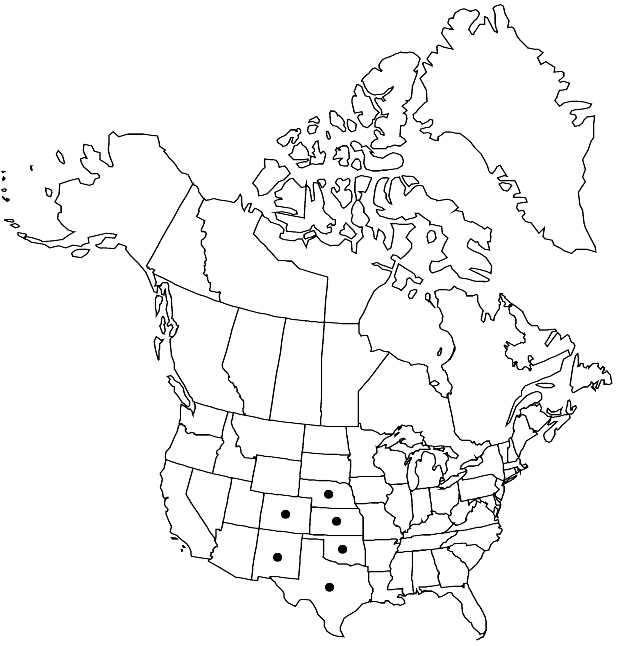Difference between revisions of "Physaria ovalifolia"
Novon 12: 326. 2002.
FNA>Volume Importer |
RevisionBot (talk | contribs) m (Bot: Adding category Revised Since Print) |
||
| (8 intermediate revisions by 3 users not shown) | |||
| Line 8: | Line 8: | ||
}} | }} | ||
|common_names=Roundleaf bladderpod | |common_names=Roundleaf bladderpod | ||
| − | |basionyms={{Treatment/ID/ | + | |basionyms={{Treatment/ID/Basionym |
|name=Lesquerella ovalifolia | |name=Lesquerella ovalifolia | ||
|authority=Rydberg | |authority=Rydberg | ||
| + | |rank=species | ||
| + | |publication_title=in N. L. Britton and A. Brown, Ill. Fl. N. U.S. | ||
| + | |publication_place=2: 137, fig. 1749. 1897 | ||
}} | }} | ||
|synonyms={{Treatment/ID/Synonym | |synonyms={{Treatment/ID/Synonym | ||
|name=Lesquerella engelmannii subsp. ovalifolia | |name=Lesquerella engelmannii subsp. ovalifolia | ||
|authority=(Rydberg ex Britton) C. Clark | |authority=(Rydberg ex Britton) C. Clark | ||
| + | |rank=subspecies | ||
}} | }} | ||
|hierarchy=Brassicaceae;Brassicaceae tribe Physarieae;Physaria;Physaria ovalifolia | |hierarchy=Brassicaceae;Brassicaceae tribe Physarieae;Physaria;Physaria ovalifolia | ||
| Line 26: | Line 30: | ||
-->{{Treatment/Body | -->{{Treatment/Body | ||
| − | |distribution= | + | |distribution=Colo.;Kans.;N.Mex.;Nebr.;Okla.;Tex. |
|discussion=<p>Subspecies 2 (2 in the flora).</p> | |discussion=<p>Subspecies 2 (2 in the flora).</p> | ||
|tables= | |tables= | ||
| Line 50: | Line 54: | ||
-->{{#Taxon: | -->{{#Taxon: | ||
name=Physaria ovalifolia | name=Physaria ovalifolia | ||
| − | |||
|authority=(Rydberg) O’Kane & Al-Shehbaz | |authority=(Rydberg) O’Kane & Al-Shehbaz | ||
|rank=species | |rank=species | ||
| Line 57: | Line 60: | ||
|basionyms=Lesquerella ovalifolia | |basionyms=Lesquerella ovalifolia | ||
|family=Brassicaceae | |family=Brassicaceae | ||
| − | |distribution= | + | |distribution=Colo.;Kans.;N.Mex.;Nebr.;Okla.;Tex. |
|reference=None | |reference=None | ||
|publication title=Novon | |publication title=Novon | ||
|publication year=2002 | |publication year=2002 | ||
|special status= | |special status= | ||
| − | |source xml=https:// | + | |source xml=https://bitbucket.org/aafc-mbb/fna-data-curation/src/2e0870ddd59836b60bcf96646a41e87ea5a5943a/coarse_grained_fna_xml/V7/V7_1108.xml |
|tribe=Brassicaceae tribe Physarieae | |tribe=Brassicaceae tribe Physarieae | ||
|genus=Physaria | |genus=Physaria | ||
| Line 68: | Line 71: | ||
}}<!-- | }}<!-- | ||
| − | -->[[Category:Treatment]][[Category:Physaria]] | + | --> |
| + | |||
| + | [[Category:Treatment]] | ||
| + | [[Category:Physaria]] | ||
| + | [[Category:Revised Since Print]] | ||
Latest revision as of 17:14, 6 November 2020
Perennials; caudex simple or branched, (thickened by persistent leaf bases); densely pubescent (foliage usually scabrous), trichomes (sessile or short-stalked), several-rayed, rays furcate near base, (usually strongly umbonate, roughly tuberculate, less so over umbo). Stems few to several from base, erect or outer decumbent, 0.5–2.5 dm. Basal leaves: blade suborbicular to elliptic or ovate or deltate, 0.5–2(–6.5) cm, margins entire or shallowly dentate. Cauline leaves: (proximal shortly petiolate, distal usually sessile); blade narrowly elliptic or obovate, (0.5–)1–2.5(–4) cm, margins entire. Racemes compact, (± subumbellate to densely corymbiform, elongated or not). Fruiting pedicels (usually spreading at right angles, sometimes nearly erect, ± straight), 5–15(–20) mm, (stout). Flowers: sepals ± elliptic, 4.5–7(–8.5) mm, (median pair thickened apically); petals (sometimes white), suborbicular to obovate or obdeltate, 6.5–15 mm, (base narrowing to broad claw, apex sometimes emarginated). Fruits (sessile or shortly stipitate, less than 1 mm), subglobose to broadly ellipsoid, inflated or slightly compressed (terete or subterete), (4–)5–8(–9) mm; valves (not retaining seeds after dehiscence), glabrous; replum as wide as or wider than fruit; ovules 8–16 per ovary; style 4–8(–9) mm. Seeds flattened.
Distribution

Colo., Kans., N.Mex., Nebr., Okla., Tex.
Discussion
Subspecies 2 (2 in the flora).
Selected References
None.
Key
| 1 | Caudices branched (well-developed); petals usually yellow, rarely white, 6.5-12(-14) mm, usually 1.5 times or less as long as sepals; racemes usually not elongated (subumbellate). | Physaria ovalifolia subsp. ovalifolia |
| 1 | Caudices usually simple; petals white, (9-)11-15 mm, often 2 times as long as sepals; racemes usually elongated. | Physaria ovalifolia subsp. alba |